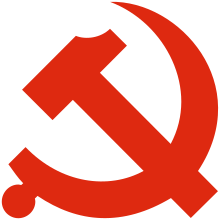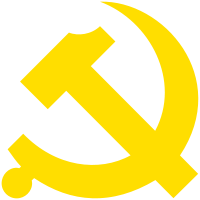International Liaison Department of the Communist Party of China
The International Liaison Department of the Central Committee of the Communist Party of China (ILD; Chinese: 中国共产党中央委员会对外联络部; pinyin: Zhōngguó Gòngchǎndǎng Zhōngyāng Wěiyuánhuì Duìwài Liánluò Bù), better known by its former name International Department (ID), is an agency under the Central Committee of the Communist Party of China in charge of conducting relations with and influencing foreign political parties, think tanks, and academics as well as finding ways to divide potential critics.[1][2][3]
中国共产党中央委员会对外联络部 | |
 | |
| Abbreviation | Zhonglianbu (中联部) |
|---|---|
| Formation | 1951 |
| Type | Department directly reporting to the Central Committee |
| Headquarters | Fuxing Road, Haidian District, Beijing |
Director | Song Tao |
Deputy directors | Liu Hongcai, Chen Fengxiang, Zhou Li, Guo Yezhou, Xu Lüping |
Parent organization | The Central Committee |
| Affiliations | Ministry of Foreign Affairs of the People's Republic of China |
| Website | www |
History
The department was established in 1951, and was tasked with overseeing relations with foreign communist parties, especially the Communist Party of the Soviet Union and the socialist bloc. The ILD's mandate became more important following the Sino-Soviet split, as the party began more aggressively seeking supporters for its position among communist parties operating overseas.[4] Afterwards it maintained ties between the CPC and the Maoist parties around the world, often attempting to foment revolution abroad by funneling money and resources to left-wing and rebel groups.[5][6] From 1962 through the first half Cultural Revolution, foreign relations were mainly conducted by Kang Sheng on behalf of the Politburo Standing Committee.[5]
In the 1980s under Deng Xiaoping, the ILD expanded its mission to include cultivating relations with non-communist parties, and shed its overtly revolutionary objectives. In this era, the department sought to forge ties with "any foreign political party that was willing to meet with it."[5] With the end of the Cold War and collapse of the Soviet Union, the ILD's expanded mission of engaging with parties across the political spectrum became more important.[4]
List of directors
Directors of the ILD:[7]
- Wang Jiaxiang (1951 – March 1966)
- Liu Ningyi (acting; June 1966 – April 1968)
- Geng Biao (January 1971 – January 1979)
- Ji Pengfei (January 1979 – April 1982)
- Qiao Shi (April 1982 – July 1983)
- Qian Liren (July 1983 – December 1985)
- Zhu Liang (December 1985 – March 1993)
- Li Shuzheng (March 1993 – August 1997)
- Dai Bingguo (August 1997 – March 2003)
- Wang Jiarui (March 2003 – November 2015)
- Song Tao (November 2015 – present)
See also
References
- Lulu, Jichang (2019-11-26). "Repurposing democracy: The European Parliament China Friendship Cluster". Sinopsis. pp. 27–29. Archived from the original on 2019-12-10. Retrieved 2019-11-26.
- Thomas, Neil (January 22, 2020). "Proselytizing Power: The Party Wants the World to Learn from Its Experiences". Macro Polo. Archived from the original on January 23, 2020. Retrieved January 24, 2020.
- Fitzgerald, John (October 1, 2019). "Mind your tongue: Language, public diplomacy and community cohesion in contemporary Australia—China relations". Australian Strategic Policy Institute. Archived from the original on April 13, 2020. Retrieved 2020-04-13.
- Sutter, Robert (2011). Historical Dictionary of Chinese Foreign Policy. Plymouth, United Kingdom: Rowman and Littlefield Publishing Group. p. 128. ISBN 978-0-8108-6860-1. OCLC 971172812.
- Brady, Anne-Marie (2003). Making the foreign serve China: managing foreigners in the People's Republic. Lanham: Rowman & Littlefield Publishers. ISBN 0742518612. OCLC 52595251.
- Directorate of Intelligence, Central Intelligence Agency (December 1971). "Intelligence Report: The International Liaison Department of the Chinese Communist Party" (PDF). Archived from the original (PDF) on May 31, 2012. Retrieved May 28, 2012.
- "Archived copy" 宋涛接替王家瑞任中央对外联络部部长 (in Chinese). Xinhua. 2015-11-26. Archived from the original on 2015-11-27. Retrieved 2015-11-26.CS1 maint: archived copy as title (link)
.svg.png)
